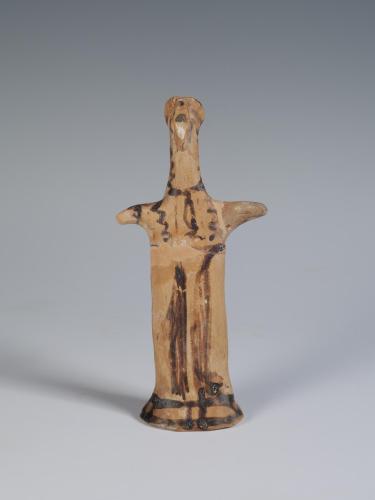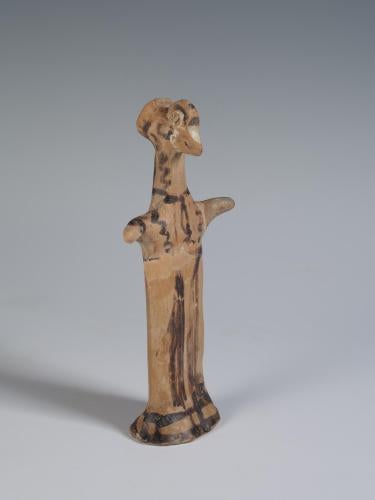Catalogue Entry

This vase is one of a collection of Greek artifacts held by the CU Art Museum.
Gift to CU Classics Department
Transferred to CU Museum of Natural History
Transferred to CU Art Museum (2006)
Height: 15.9 cm
Width: 7.0 cm
Depth: 3.8 cm
Date: c. 550 B.C.E.
Origin: Boeotia (central Greece)
Description: Handmade terracotta figurine of a standing female figure. Buff clay with details added in black.
Additional photos of this object show details of its back and decorative features.
Discussion
This is an example of a Boeotian terracotta figurine of the mid-6th century B.C.E. (1). It is made of a buff or pale orange clay and decorated with dark brown to black slip. The figurine is solid and so flat that it is nearly two-dimensional. The human form has been simplified to a rounded base, a plank-like body with two arms that project as short, tapering cylinders from the shoulder. The plank-like neck extends straight upward from the shoulders. The head has more depth than the body and extends back and upward, ending in a flat-topped hat called a polos. A volute from the polos or perhaps a tuft of the figure's hair stretches onto the figure's face, which is pinched in a relatively simple form. Decoration is added in a dark brown or black slip on the body, hat, and face. Two horizontal black lines encircle the rounded base. A black line around the figure's midsection may indicate a belt, from which dangle two sets of vertical lines that extend down most of the legs in a tassle-like fashion. Three horizontal lines decorate the back of the figure's torso. A black band around the figure's neck suggests a ribbon that is tied at the center and has ends that dangle down the front of the torso. At the nub terminal of the right arm is a black band, perhaps a bracelet. A single tendril of hair curls on either side of the neck , while three straight vertical lines at the back suggest more hair. The polos is decorated with two black lines that encircle the top and bottom. The front tendril, belonging either to the polos or to the figure's hair, is painted black. Two simple eyes are indicated on either side of the figure's pointed face.
The figurine is identified as representing a female figure based on the style of its hair and dress, as well as by comparison with contemporary figurines. Depending on its findspot, which is unknown at the time of  publication, this figurine could have functioned as a votive dedication at a sanctuary, a funerary offering, or a part of a domestic shrine (2). The identification of who, specifically, the figurine is meant to represent is unclear. A 6th century B.C.E. East Greek figurine in the CU Art Museum's collection holds a bird, perhaps a dove, that suggests its identification as a statuette of the goddess Aphrodite. A 6th century B.C.E. Laconian figurine in the collection, however, is like the Boeotian example in that it has no additional attributes that would allow an identification as either human or divine.
publication, this figurine could have functioned as a votive dedication at a sanctuary, a funerary offering, or a part of a domestic shrine (2). The identification of who, specifically, the figurine is meant to represent is unclear. A 6th century B.C.E. East Greek figurine in the CU Art Museum's collection holds a bird, perhaps a dove, that suggests its identification as a statuette of the goddess Aphrodite. A 6th century B.C.E. Laconian figurine in the collection, however, is like the Boeotian example in that it has no additional attributes that would allow an identification as either human or divine.
Comparanda
- Frederick R. Grace, Archaic Sculpture in Boeotia (Rome: L'Erma di Bretschneider, 1969): 21
- Reynold Alleyne Higgins, Catalogue of Terracottas in the British Museum (London: British Museum, 1954): No. 776.
- J. Schneider-Lengyel, Griechische Terrakotten (Munich: Verlag F. Bruckmann, 1936): Nos. 4 and 7.
Footnotes
- Chara Tzavella-Evjen, Greek and Roman Vases and Statuettes from the University of Colorado Collection (Athens: Archaiologikon Deltion, 1973): 192-197.
- Reynold Alleyne Higgins, Catalogue of the Terracottas in the Department of Greek and Roman Antiquities, British Museum: Vol. 1 (London: British Museum, 1954): 7-8.
Reference
- Chara Tzavella-Evjen, Greek and Roman Vases and Statuettes from the University of Colorado Collection (Athens: Archaiologikon Deltion, 1973): 192-197.
